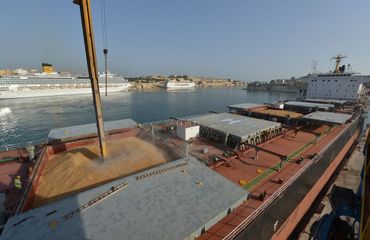São Paulo – Cerealpar, a cereals brokerage company based in Curitiba, the capital of Brazil’s Paraná state, has picked Malta, an European archipelago on the Mediterranean Sea, as its hub for selling Brazilian agricultural products to North African countries. Out of Malta’s Kordin Grain Terminal, the Brazilian company ships Brazilian agribusiness products to Arab African countries.
“One of the problems of many North African ports is that they lack the infrastructure to accommodate Panamax-type bulk carrier ships, whose capacity is 65,000 tons of grain,” says Cerealpar Business Development director Steve Cachia. Since the Kordin Grain Terminal has 90,000 tons of static capacity and is located only 300 km away from Tunisia, for instance, the brokerage company ships the product to Malta in large vessels, and from there the goods are transshipped to North Africa in smaller ships.
Cachia, who has lived in Brazil for 25 years but was born in Malta, was appointed as consultant to the Kordin Grain Terminal in February of this year. At the terminal, he says, the grain can also be stored, in case importers wish to buy ahead of time to take advantage of pricing or as a precaution against an undersupply or product scarcity. “By using a third-party country we believe we can bring Brazil and the North African countries closer together,” he told ANBA.
Cerealpar sells grain on the physical market, both domestically and internationally. The company deals with buyers and sellers in Brazil and abroad, and renders consulting services. In addition to closing deals, it keeps track of the whole process, from logistics to payment, and provides information on price trends and market behavior to clients.
The brokerage company focuses primarily on soybean and maize, but is broadening its export portfolio. Its most-shipped products are maize, soybean and bran, but it also deals in soy oil, sorghum, wheat and cottonseed. The company works with at least 20 different countries. The Arab ones are Saudi Arabia, Algeria, the United Arab Emirates, Jordan, Libya, Morocco and Tunisia.
“We are seeking this triangulation to open doors into Arab countries,” says Cachia about the deals done via Malta. The European archipelago is a new strategically-placed financial hub with historical and traditional ties with North Africa, and Cerealpar believes that makes it easier to map growing demand from Arab countries through it. According to Cachia, Algeria and Tunisia were the first in the region to show interest in the brokerage company’s work, while Tunisia and Libya are the countries most interested in using Malta as a hub.
Cachia also notes that Brazilian grain trade with Arab countries is on the rise, but that mutual distrust, cultural differences and the lack of a tradition in South American trade with the Middle East and North Africa (MENA) are still in place. “That is being overcome little by little,” he says, adding that Cerealpar’s base in Malta will be a first step on which to build future progress. “By introducing Brazil via this hub model, we sense greater trust, at least when it comes to first approaching clients,” says the Business Development director.
According to him, Brazil’s booming status as a major global grain supplier and geopolitical and economic changes in the MENA region are driving up trade. “In 2015, for example, Brazilian maize exports soared 138% to Egypt, 64% to Saudi Arabia, 34% to Algeria and 19% to Tunisia, to name a few. Soybean exports from Brazil were up 58% to Egypt, 40% to Saudi Arabia and 6% to Tunisia. Brazilian soya bran exports to North Africa and the Middle East were no different. Saudi Arabia’s imports were up 241%, and Egypt and Jordan, which had not purchased Brazilian soya bran in 2014, bought significant amounts,” he says.
Cerealpar is also carving out space abroad as a provider of information on the global grain market. Cachia has delivered lectures in Brazil and around the world, including France, the United States, Paraguay, the UAE, Indonesia, Singapore, Malta and Panama. By the way, in attending forums, congresses and seminars in those countries, Cerealpar got in touch with Arab agribusiness industry players.
More on Cerealpar
Besides brokering deals, Cerealpar sustains agreements with brokerage firms in the Chicago Stock Exchange and in São Paulo’s BM&FBovespa, and provides clients with guidance for protection against price fluctuations and volatility. It also takes part in Brazilian government grain auctions and is a partner of ports operator Grano de Paranaguá, which operates out of the Port of Paranaguá, as well as of the chemical fertilizer manufacturer Frankental.
Cerealpar was established in 1989 by four partners, with backgrounds as physical brokers, cooperative traders, port operators and stockbrokers. “Sensing that the market was on the verge of a new boom, which would lead to an increase in number of market players, they decided to join forces,” says Cachia. Currently, the company relies on roughly 50 collaborators and has offices in Cuiabá, Lucas do Rio Verde and Sinop, in the state of Mato Grosso; in Rio Verde, Goiás; plus its Curitiba headquarters.
*Translated by Gabriel Pomerancblum




